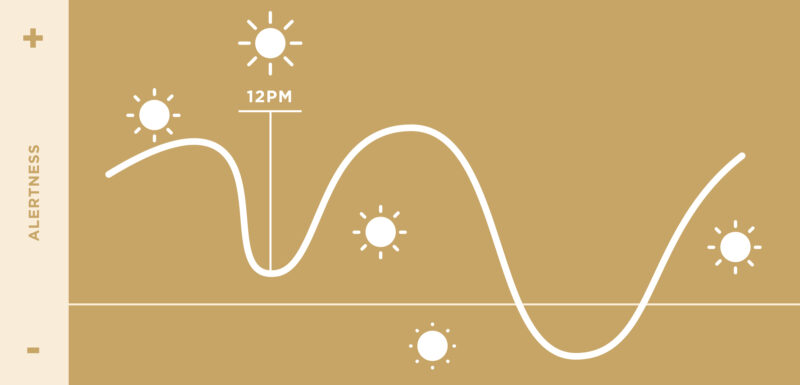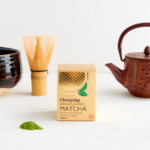The afternoon slump
Everything is bubbling along nicely, your day is going to plan and your to-do list is getting shorter. Suddenly……BAM, you hit a wall and all you want to do is curl up and nap.
The afternoon slump. Sometimes post-lunch, nearly always comes out of nowhere without any rhyme or reason. It is blamed on lunchtime drinks, or eating some carb-loaded pre-packaged meal deal, maybe even using up all your energy reserves ‘working too hard’ earlier on in the day. All of these may impact your afternoon, but there are lots of other reasons too why you may feel that need to huddle down and switch off.
Your circadian rhythm is disrupted
Your circadian rhythm is your body’s sleep-wake cycle that controls when you feel alert and when you feel tired and aligns your sleep and wakefulness with day and night. Light greatly interferes with your circadian rhythm. Using your phone or watching television before you fall asleep may disrupt your sleep-wake cycle.
Circadian rhythm disruption isn’t the only way that your sleep-wake cycle can cause you to feel sleepy in the afternoon. There is a natural dip in alertness thanks to your circadian rhythm in the mid-afternoon, which can cause fatigue.

Graphics and Circadian Rhythm courtesy of and with thanks to Solgar (original article here)
Poor diet and lack of nutrients
Energy or lack thereof is directly impacted by diet. Moreover, the type and frequency of foods that are eaten. Poor blood sugar balance is caused by the roller coaster of sharp elevations and dips in blood glucose. This can be caused by a that is rich in simple carbohydrates, such as sugar, white bread, white rice or white pasta, skipping meals or eating a meal that has no carbohydrates at all.
The lunchtime meal should provide a variety of different coloured wholefoods. Wholefoods are unprocessed and eaten in their entirety. For example, roast root vegetables and spiced tofu or scrambled eggs with spinach, tomatoes and sweet potato. The natural carbohydrate sources from the root vegetables and potato in this example, will release their energy in a slow fashion, therefore peaks and troughs in blood glucose are balanced to allow a steady balance in energy that lasts the whole afternoon.

Diet and nutrients advice courtesy of and with thanks to Viridian Nutrition (original article here)
Water, water and more water
It’s simple, free and the best drink for maintaining energy throughout the day. If you are feeling sluggish or tired then water should be the first option you turn too. When energy slumps, all too often people look to caffeine for a boost when really they are just dehydrated and need water.
Plain water is always best, but if you want a little flavour then please avoid bottled flavoured water or fizzy water. Instead, I recommend that you get creative with fruits and vegetables to make home-made, flavourful, fruit-infused water.
Many people like to add lemon to their water, but other simple fruits which can add flavour include oranges and limes. You could also try some tasty combinations such as mint and cucumber, as well as strawberries, oranges and mint leaves.

Graphics and hydration section courtesy of and with thanks to A.Vogel (original article here)
Keep stress to a minimum
Cortisol is the ‘get up and go’ hormone that releases into your system in the morning to wake you up feeling energised. Levels of cortisol gradually taper off throughout the day so that you can sleep in the evening. However, cortisol is also released in response to stress or stimulants to give you a burst of energy. If this happens too often, it may disrupt your natural energy rhythm and cause fluctuations that result in difficulty getting to sleep and waking up.
Stress is our body’s method of reacting to a challenge – whilst a small amount may be a positive response, too much can lead to physical and emotional health issues and can compromise your entire body.

Stress section courtesy of and with thanks to BioCare (original article here)
Get moving to regain focus and increase productivity
Get the blood going to your brain with movement of any kind…walk, jump, skip, stretch or jog, anything that gets your blood pumping and your body doing something different.
Pukka Herbal advise to do three rounds of ten little jumps and feel the energy, the blood going to your brain and all your cells and the zoom of vitality. This is a wonderful way to bring oxygenated blood to the brain to make you brainier and more focused.
Then make tight fists and pat down your whole body to stimulate your immune system and bring blood flow to your whole body. This life-force in the body can really help your focus and to reinvigorate you when you’ve been studying or focusing at a desk for a while.
To help to combat neck and shoulder tension, which can really build up when we’re faced with times of stress, you can stand up and swing your arms around your body, lightly patting yourself on the shoulders to relieve tension which often especially builds up in the neck and shoulders. A great re-vitalizer, as well as being excellent for reducing shoulder tension.

Get moving section courtesy of and with thanks to Pukka Herbs (original article here)
Our top tips to avoid an afternoon slump

Get some fresh air.....take a walk outside, or sit in the garden for ten minutes. Get a break from whatever you are doing and change up the scenery and your surroundings.

Replace your morning coffee with green tea, or the delicious Matcha green tea. Full of antioxidants, this natural caffeine boost will extend your energy reserves without the jitters or crash that comes with coffee and energy drinks.

Ditch the sugary snacks and enjoy delicious healthy filling snacks such as the Nourish Raw Coconutty bar and gluten free cookies, or the Unrefined Bakery snack bars - these brands specialise in being refined sugar free and have excellent ingredients to keep your blood sugar level in check.

Stretch regularly. For every hour you spend sitting at a desk, driving or being in the same position you should move around and stretch for at least ten minutes to keep the blood flowing and your muscles moving. This also gives your eyes a rest from staring at screen or focussing for too long on one thing.
Let's talk about your energy levels
Feeling tired is really common and most people would like to have more energy! There are many reasons why people feel tired at any time of day and it can range from lack of sleep or poor diet right through to more medical reasons such as hypothyroidism, anaemia or Chronic Fatigue Syndrome to name but a few. The key is to look at what might be causing the fatigue and address that.
If you want to talk about your energy levels, get in touch using the form below and our Nutritional Therapist will contact you to offer advice. This is completely FREE and will involve a phone call or instore chat lasting approximately 15 minutes.
